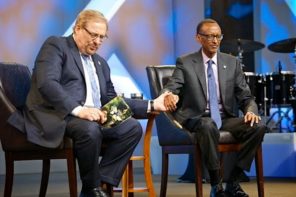It may have been the first time a bed was ever on stage at Gramercy Theater, a mid-sized performance venue on East 23rd Street in New York City. But the nine-piece band circled around, half of its members hidden behind bedside candles and lamps, and played as if it weren’t even there. “Your grace abounds to me, your grace abounds to me,” they sang. “Jesus, in you I find all that I need.”
The capacity-crowd of worshippers joined in, arms in the air, and then they prayed. They prayed for marriages, for husbands and for wives, for reconciliation. They prayed for romance and commitment, and for miracles. They prayed for singles, for forgiveness, and for cleansing.
Sex was the topic of the night at Hillsong NYC’s midweek eXchange service, and guest speakers Ed and Lisa Young (the Texas megachurch pastor and wife who attracted international media attention at the beginning of this year for spending 24 hours in bed on the roof of their church) preached to the young, hip congregation about God’s plan for intimacy. “It’s all about context: the marriage bed, a God-given gift and a God-united covenant,” Pastor Young declared, sitting on the bed and looking at his wife. “When the content—sex—is in the right context, we’ll discover God’s destiny for our lives. But when we take the content out of context, the result is ultimately going to be chaotic.” And the group responded: “Wow. Yes, that’s good. That’s good.”
I’m Too Sexy for My Church
The Youngs, in a well-rehearsed shtick, were publicizing their book, Sexperiment: 7 Days to Lasting Intimacy With Your Spouse, in which they challenge husbands and wives to have sex every day for a week straight. They are the latest in a line of pastors—Mark Driscoll perhaps the most well-known among them—who claim that society has taken sex too far, and that the church hasn’t taken it far enough; that culture has hijacked sex, and that God has been left out of the discussion for too long. By openly promoting sex—among married heterosexual couples—they are trying to distance themselves from the prudish attitudes commonly associated with conservative Christians and working to reach a generation of hip, culturally savvy, young evangelicals. (Although as a recent Religion News Service report indicates, more direct sex talk is a growing trend even among traditional evangelicals.)
For the middle-aged Youngs—married 30 years and parents of four, image-obsessed and raking in millions as leaders of an ever-growing church empire—the attempt to fit into hip Christian culture would seem futile. They are wannabes, as Brett McCracken, author of Hipster Christianity, would put it. “One of the trendiest ways for many wannabe hip churches to be shocking is to talk frankly about sex,” he writes. “Shock value ultimately comes down to this: making the case that Christianity isn’t the boring, whitewashed, clean-cut, safe religion people assume it to be.”
Mark Driscoll has had a corner on shock-value pastoring since the emergence of his Seattle-based Mars Hill Church, and his latest book, Real Marriage: The Truth About Sex, Friendship, and Life Together, co-authored with his wife Grace, is the most recent example of his penchant for the dramatic. The book sparked immediate outrage among Christians, who labeled it too sexy—but the heaviest criticism came from those, Christians and non-Christians alike, who found it sexist.
The Youngs’ Sexperiment, published just a week later, also dwelled on sex and marriage, but it didn’t spark the same angry reaction as Real Marriage. Maybe it’s because “the Youngs—unlike the Driscolls—are only comfortable talking about sex in the abstract,” as Tracy Clark-Flory noted at Salon.
But the inconsistent responses have more to do with the Driscolls than with the Youngs. Driscoll’s provocative words and actions continue to shock because he is a “hipster pastor,” because he leads a young congregation in a cool city, because it remains difficult for people to come to terms with the fact that hip and theologically conservative can, and do, coexist.
If, by virtue of his shock-value ways, Driscoll is indeed a wannabe, to use McCracken’s language, then the Youngs are double wannabes. But their attempt at a shock show worked at Hillsong NYC, the bright-lights and big-worship year-old plant of a network of Australian Pentecostal churches. “Some things were a little cheesy,” Nancy Mickel, a 30-year-old Hillsong member, admits. “But in the real world, sex does come up. It’s good to know where we should stand.”
From Spectacle to Conversation
At hipster churches at the other end of the spectrum, churches that have embraced a more relaxed and egalitarian leadership structure with an emphasis on talking with the community and not at it, the Youngs (or Driscoll, for that matter) would likely have a hard time getting young people to appreciate the spectacle. These churches, the majority of which are nondenominational, have shifted away from the anti-intellectualism of the evangelical past and have shown an earnest desire to question and to debate—and, significantly, to critique.
That’s not to say that they don’t discuss the importance of a healthy marital sex life, or stress the importance of abstinence. But the conversation takes a different shape. There are no gimmicks or publicity stunts. There are no cute phrases—“sex is between the ears before it’s between the legs, it’s north before it’s south, it’s mental before it’s genital,” as Young told the Hillsong gathering—and there is no self-promotion. It is, or at least strives to be, an actual conversation.
“If people are hooking up or having sex, and they don’t seem to have any problem with it, there’s no judgment from me,” Aaron Monts, pastor of IKON Christian Community in San Francisco, says. “I simply want to walk and have a loving conversation with them about why they’re doing what they’re doing… as opposed to telling them, ‘oh, you shouldn’t do that.’”
So while many young Christians have rejected the notion of sex as negative or shameful, there is a significant divide in the way in which their pastors are addressing the issue. Many of the hipster churches I’ve reported on across the country have adopted an attitude similar to Monts’. They don’t necessarily condone sex before marriage, but they’re also not going make a performance of telling you (that God says) to wait. It is, in many ways, analogous to their softer-sell approach to evangelizing: Jesus loves you, and Jesus died for you, but we’re not going to hit you over the head with it.
Then there are the Youngs and the Driscolls, pastors of megachurches, always looking outside their home churches, away from their cities, for attention. And they’re definitely doing something right. Both Sexperiment and Real Marriage became New York Times bestsellers almost immediately after publication. There’s no question that their messages, and their aggressive way of communicating them, are reaching people—hipsters included—even if their strategies, and often the messages themselves, are decidedly unhip.
But despite the shift toward using more crass language to address a (formerly) taboo subject, Driscoll and Young and now, it seems, a range of other evangelical pastors, are still bent on employing the same uncool shock tactics of their predecessors.
Research for this report was supported in part by a 2011 Knight Grant for Reporting on Religion and American Public Life.




